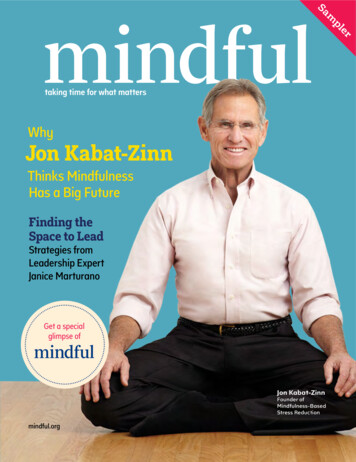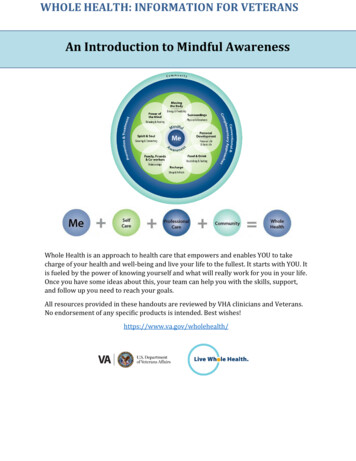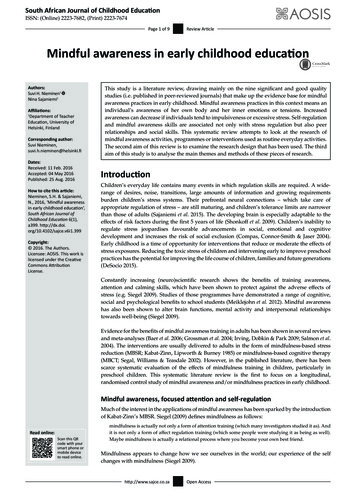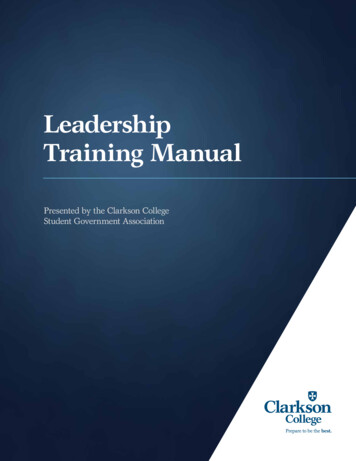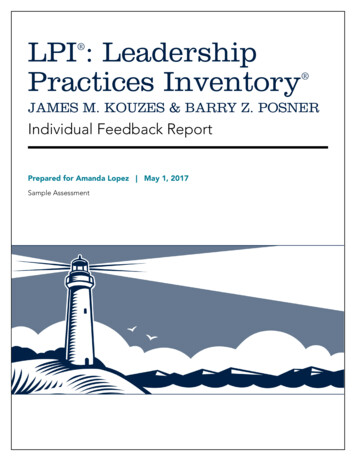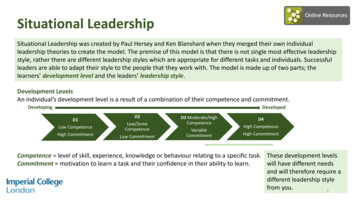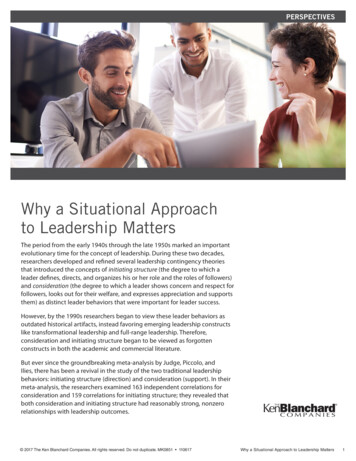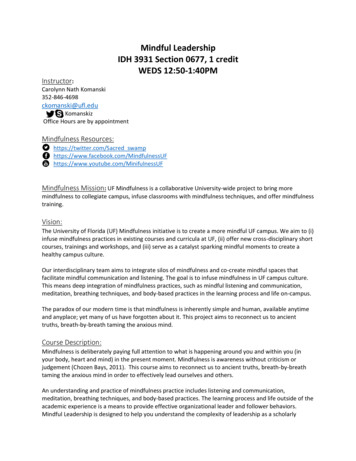
Transcription
Mindful LeadershipIDH 3931 Section 0677, 1 creditWEDS 12:50-1:40PMInstructor:Carolynn Nath ce Hours are by appointmentMindfulness Resources:https://twitter.com/Sacred /www.youtube.com/MinifulnessUFMindfulness Mission: UF Mindfulness is a collaborative University-wide project to bring moremindfulness to collegiate campus, infuse classrooms with mindfulness techniques, and offer mindfulnesstraining.Vision:The University of Florida (UF) Mindfulness initiative is to create a more mindful UF campus. We aim to (i)infuse mindfulness practices in existing courses and curricula at UF, (ii) offer new cross-disciplinary shortcourses, trainings and workshops, and (iii) serve as a catalyst sparking mindful moments to create ahealthy campus culture.Our interdisciplinary team aims to integrate silos of mindfulness and co-create mindful spaces thatfacilitate mindful communication and listening. The goal is to infuse mindfulness in UF campus culture.This means deep integration of mindfulness practices, such as mindful listening and communication,meditation, breathing techniques, and body-based practices in the learning process and life on-campus.The paradox of our modern time is that mindfulness is inherently simple and human, available anytimeand anyplace; yet many of us have forgotten about it. This project aims to reconnect us to ancienttruths, breath-by-breath taming the anxious mind.Course Description:Mindfulness is deliberately paying full attention to what is happening around you and within you (inyour body, heart and mind) in the present moment. Mindfulness is awareness without criticism orjudgement (Chozen Bays, 2011). This course aims to reconnect us to ancient truths, breath-by-breathtaming the anxious mind in order to effectively lead ourselves and others.An understanding and practice of mindfulness practice includes listening and communication,meditation, breathing techniques, and body-based practices. The learning process and life outside of theacademic experience is a means to provide effective organizational leader and follower behaviors.Mindful Leadership is designed to help you understand the complexity of leadership as a scholarly
discipline that can be taught (Bennis, 1989; Bass, 1994) alongside the evolution of mindfulness practice.It is important that you understand the difference between the socialization of a leader, leadershiptheory, and the philosophy of mindfulness. Many successful leaders acquire their leadership skills frompractice, in other words, they are socialized into leadership as they have learned from their experiences.Learning Principles:1. Learning is enhanced by the use of a variety of techniques being applied within an academic course.2. Self-Reflection, dialogue, and constructive feedback is important for learners to grow and improve.3. More concrete, real‐life activities enhance learning and the applicability of knowledge in order totransfer.4. Student‐directed assignments are essential to creating personal buy‐in and ownership to improveindividual outlooks.5. Prior experiences, attitudes, and beliefs influence learning. Understanding and owning this biasimpacts learning progression.6. Mindfulness is a practice which the student is deliberately paying full attention to what is happeningaround them and within them. This alters their ability to learn and concentrate.Essential Questions and Course Objectives:EQ1: What is context for mindful leadership?O1. Understand terminology, definitions and used of mindfulness and mindful leadership.O2. Identify and explain the philosophy and theory which create the foundation for mindfulness,leadership, and mindful leadership.Q3. Apply context and explain how historical leaders have applied mindful leadership practice.EQ2: How is mindful leadership beneficial?O4. Define the proven scientific benefits of mindfulness, leadership and mindful leadership.O5. Apply how mindful leadership will relate to me or my chosen profession.EQ3: What is the practices of mindfulness or mindful leadership?O6. Identify resources in which I can use to practice mindful leadership.O7: Participate and practice forms of mindfulness in order to understand different techniques.Q8. Actualization of how authentic leadership and reflection are a part of mindful leadership.EQ4: How can mindful leadership be transferrable?O9. Design a tool kit which will be utilized to implement the practice mindful leadership intotheir life or chosen profession.O10. Apply how mindful leadership can be used in a professional work environment.EQ5: How can I apply mindful leadership?O11. Apply mindful leadership practice to provided case scenarios.O12. Identify mindful leadership practice through observation and research.O13. Develop a plan of action on how I can utilize mindful leadership in my daily living.O14. Analyze how mindful leadership can be applied in different aspects of personal andprofessional life.Transfer Goals:Student(s) will be able to do the following upon completion of this course: Define terms used in mindful leadership. Articulate an overview of scientific research on mindfulness impacts on the humanbody.This syllabus is subject to change at the discretion of the instructor.2
Can articulate mindfulness practice of a person through observation or by reviewing abiography of a historical leader.Identify forms of mindful practice.List various practices meditation and mindfulness techniques.Identify their personal preferences for meditation and mindfulness techniquesCreate a toolkit for mindfulness practice which could be utilized in a professional workenvironmentRequired and Recommended Texts and Tools:Delizonnna, L., Anstedt, T. (2014). Mindful Leaders: A Self-Coaching Guide & Toolkit (Paperback)Finding the Space to Lead: A Practical Guide to Mindful LeadershipAdditional Readings or articles that will be supplied through E-Learning:Greeson, J. M. (2009). Mindfulness research update: 2008. Complementary Health Practice Review.14(1). 10–18.Hall, L. (2013).Mindful Coaching: How Mindfulness Can Transform Coaching Practice.ISBN:9780749465667 http://library.books24x7.com/toc.aspx?bookid 50886Hanson, R. (2013). Hardwiring happiness: The new brain science of contentment, calm, and confidence.New York, NY: Harmony Books.Hougaard, R., Carter, J. and Coutts, G. (2015). Mindful leadership: Achieving results bymanaging the mind. DOI: 10.1002/ltl.20218Marturano, J. (2014). Northouse, P.G. (2016). Leadership: Theory and practice (7th ed.). Thousand Oaks,CA: Sage.Kabat-Zinn, J. (2009). Wherever you go, there you are: Mindfulness meditation in everyday life. NewYork, NY: Hachette Books.Rechtschaffen, D. (2014). The way of mindful education: Cultivating well-being in teachers andstudents. New York, NY: WW Norton & Company.Tan, C. M. (2012). Search inside yourself: Increase productivity, creativity and happiness. New York, NY:HarperCollins.We will use activities and reading from these free public documents. Pages and documents will be linkedin your reading section of the course schedule.Examples of these 013/docs/managestressworkbook ractice-logs.pdfAdditional Required Resources:E-LearningFree Phone App (Android and iPhone): Options include Calm; Stop, Breathe & -worthy-of-your-attention/This syllabus is subject to change at the discretion of the instructor.3
Assignments1. Identifying NEW Information (10 points) Each student will have the opportunity to identify an article, study, program, application orresource for mindfulness or mindful leadership. Each student will be expected to present once on this information in-class. Each studentmust explain (1) where they found the information, (2) how they believes it relates to thiscourse, (3) who it could benefit and (4) what circumstances or situations it may be bestutilized in. (5) The student must also ask their peers 1-2 thought provoking questions aboutthe information they have shared in order to prompt discussion. (5 points) Each student must post the resource online in a designated space, after the class session inwhich they presented. (5 points) Students will sign up on the 1st day of class for the class which they will present NEWinformation. Information must be different than the course information, readings andresources.2. Self-Reflection Journal: mindfulness experience reflection (5 points each) Weekly typed reflection journal on course experience and practice of mindfulness. Journal entry must be at least 200 words for each online post. Post occurs after each class session, due by Friday evening. Exact time and dates will beposted on E-Learning/Canvas. Journal should include images, web links and resources utilized over the course of the weekto promote reflection or thought.3. Mindfulness Project: Poster Presentation (20 points)Creating your own mindfulness exercise or mindfulness plan for a professional work environment ofyour choice. This may or may not be related to academic pursuits. Posters will be presented in classand affiliates with the UF mindfulness program, faculty from the Honors program, and otherdepartments will be invited to hear about your ‘tool y/5-tips-for-a-mindful-2015 b -work/4. Mindfulness Tool Kit (20 points)In conjunction with the poster assignment, you will create a written toolkit or manual in which youwill outline your plan in substantial detail on how to educate and then apply mindful leadershipwithin your industry of choice. You will include resources, references, timeline, activities, andlocation/budget/planning details. This plan should not be a one-time event. This plan should be aprogressive plan in which there is an introduction, education, buy in period, pilot and evaluationperiod, then implementation process.5. Assignment Choice (10 points)Observation Leadership Assignment OR Interview Assignment: Leaders knowledge and practice ofMindfulnessObservation Leadership Assignment (10 points)This syllabus is subject to change at the discretion of the instructor.4
You will observe a leader of your choice, in person and with permission. You should only beobserving and taking notes. You should not be an active participant in the environment. Yourobservation should beAnswer the following questions: What is the setting and situation in which you are observing the leader? Are there environmental influences which can impact the leader (location, noises, time ofday, context of situation, other people, etc.) ( Are you able to identify the leadership style that is being utilized by this leader? Why or whynot. What are some of the leaders:o Non-verbal’s (eye contact, body language or movements, seated/standing,breathing, note taking, etc.)o Verbal communications (tone, delivery, word choice, delivery of message)o Physical appearance (business, professional, casual, situation appropriate, etc.) What were some surprising aspects of this observation? This includes things you may havenot otherwise noticed if not provided this assignment.ORInterview Assignment: Leaders knowledge and practice of Mindfulness (10 points)You will interview a leader of your choosing who is different than your observation leader anddiscuss their understanding and application of mindfulness within their industry. This interview canbe conducted by phone, email, skype, or in person. You will need to be prepared to explain thepractice of mindfulness, including examples, to the person you are interviewing.Answer the following questions per the writing guidelines What is your leadership style? Where did you learn your leadership style? Do you feel you were always a leader or did you learn how to be a leader? If learned, howdid you learn? Do you take time to reflect on your leadership style? Explain mindfulness and mindful leadership. Have you heard of mindfulness before? Haveyou practiced being mindful/mindfulness? What are means in which you practicemindfulness? Would you consider yourself to be a mindful leader? If so, what does it meanto be a mindful leader?6. Historical Leader and Mindfulness Assignment (10 points)Identify a historical leader of your choice and seek understanding to identify how they lead anddetermine if mindfulness was part of their practice as a leader. To what extent did they practicebeing mindful (examples should be provided). If your choice of leader did not exhibit mindfulleadership then in what ways could they have applied the practice of mindful leadership? (Take intoconsideration cultural norms, influences and behaviors of that time/era)This research will then be presented to the class in a 5-7 min presentation.The presentation will be submitted online and follow the established guidelines for the assignment.7. Attendance and Participation Points: (5 points) per classDuring each class period, you will be expected to participate in the activities given, unless excused.Examples of participation may involve answering questions, group activities, writtenreflection, group work, classroom discussion, physical practice of mindfulness, etc.This syllabus is subject to change at the discretion of the instructor.5
Attendance and AssignmentsTo receive the maximum number of points for an assignment, it must be completed and submitted by thedue date. No work will be accepted six or more days after its original due date, unless otherarrangements have been made with the instructor.Students who are absent from class for any reason will assume complete responsibility for obtaininginformation missed during their absence and for making up missed assignments and activities. Collegeapproved field trips and competitive and leadership development events (with prior instructor approval)are considered legitimate absences with documentation. Make-up work should be arranged prior to theexpected absence. In case of emergencies, arrangements for completing make-up exams or assignmentsshould be made immediately upon return to class. All make-up work must be completed within one weekof the student’s return to class.Grade Breakdown: Please note grades are based on points not percentages. This scale is designatedbased upon the standard values in Canvas. For more clarification on the calculations of grades, pleaseuse the following link: lationgrades.html.For information on UF policies, see: info/grades.aspxAcademic HonestyIn 1995 the UF student body enacted an honor code and voluntarily committed itself to the higheststandards of honesty and integrity. When students enroll at the university, they commit themselves tothe standard drafted and enacted by students.The Honor Pledge: We, the members of the University of Florida community, pledge to holdourselves and our peers to the highest standards of honesty and integrity.On all work submitted for credit by students at the university, the following pledge is either required orimplied: "On my honor, I have neither given nor received unauthorized aid in doing thisassignment."Students should report any condition that facilitates dishonesty to the instructor, department chair,college dean, Student Honor Council, or Student Conduct and Conflict Resolution in the Dean of StudentsOffice.It is assumed all work will be completed independently unless the assignment is defined as a groupproject, in writing by the instructor. This policy will be vigorously upheld at all times in this course.Online Course Evaluation ProcessStudent assessment of instruction is an important part of efforts to improve teaching and learning. At theend of the semester, students are expected to provide feedback on the quality of instruction in thiscourse using a standard set of university and college criteria. These evaluations are conducted online athttps://evaluations.ufl.edu. Evaluations are typically open for students to complete during the last two orthree weeks of the semester; students will be notified of the specific times when they are open. Summaryresults of these assessments are available to students at https://evaluations.ufl.edu/results.This syllabus is subject to change at the discretion of the instructor.6
Expectations for Writing:In all courses in the Department of Agricultural Education and Communication’s the following writingstandards are expected to be followed, unless otherwise specified for a particular writing assignment. Notfollowing these writing standards will result in substantially lower grades on writing assignments. Proper grammar and punctuation are mandatory.Proper sentence structure is required. This means o Not using “tweet-talk” in your assignments, unless you are actually tweeting.o Making sure that your sentences have a subject, verb, and (when needed) an object.o Not having sentence fragments.o And anything else that would pertain to “proper sentence structure.”No use of first person (I, me, my, mine, our) unless denoted within the assignment rubric.No use of contractions.Good thoughts/content throughout the writing assignment.For assignments that require citations, use American Psychological Association style. Proper APAcitation and reference document is expected.Software UseAll faculty, staff and students of the university are required and expected to obey the laws and legalagreements governing software use. Failure to do so can lead to monetary damages and/or criminalpenalties for the individual violator. Because such violations are also against university policies and rules,disciplinary action will be taken as appropriate.Campus Helping ResourcesStudents experiencing crises or personal problems that interfere with their general well-being areencouraged to utilize the university’s counseling resources. The Counseling & Wellness Center providesconfidential counseling services at no cost for currently enrolled students. Resources are available oncampus for students having personal problems or lacking clear career or academic goals, which interferewith their academic performance.University Counseling & Wellness Center, 3190 Radio Road, 352-392-1575, www.counseling.ufl.edu/cwc/Counseling ServicesGroups and WorkshopsOutreach and ConsultationSelf-Help LibraryTraining ProgramsCommunity Provider DatabaseCareer Resource Center, First Floor JWRU, 392-1601, www.crc.ufl.edu/Services for Students with DisabilitiesThe Disability Resource Center coordinates the needed accommodations of students with disabilities. Thisincludes registering disabilities, recommending academic accommodations within the classroom,accessing special adaptive computer equipment, providing interpretation services and mediating facultystudent disability related issues. 0001 Reid Hall, 352-392-8565, www.dso.ufl.edu/drc/This syllabus is subject to change at the discretion of the instructor.7
Delizonnna, L., Anstedt, T. (2014). Mindful Leaders: A Self-Coaching Guide & Toolkit (Paperback) Finding the Space to Lead: A Practical Guide to Mindful Leadership Additional Readings or articles that will be supplied through E-Learning: Greeson, J. M. (2009). Mindfulness research update:
